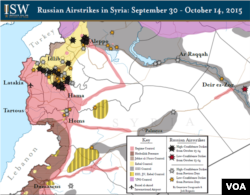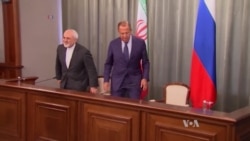World powers involved in talks on Syria's political future have agreed to a U.N.-led process that involves talks between the Syrian government and opposition and also to explore a cease-fire that would still allow strikes against terrorist groups.
The plans were outlined in a Friday news conference held by U.S. Secretary of State John Kerry, Russian Foreign Minister Sergei Lavrov and U.N. Special Envoy Staffan De Mistura.
It followed a seven-hour meeting, on Syria, that included diplomats from the 17 countries, plus the United Nations and European Union. Officials said the group agreed to meet again within two weeks.
Kerry said the diplomatic talks in Vienna complimented stepped up U.S. military efforts in Syria. A senior U.S. official announced Friday that President Barack Obama had authorized a small complement of U.S. forces to deploy to northern Syria.
"We are employing a two-pronged approach," said Kerry. "We are intensifying our counter-Daesh campaign and we are intensifying our diplomatic efforts in order to end the conflict."
Kerry said the U.S. believed the two steps were "mutually reinforcing" but said the timing of the Obama administration announcement and the Vienna talks was coincidental.
Lavrov also highlighted progress made by the group but said there was no agreement on President Bashar al-Assad's destiny.
He said Russia believes it is up to the Syrian people to decide their country's political future. The U.S. and its allies say Assad cannot be part of any long-term political solution for Syria.
Agreement on a UN political plan
A broad outline of the group’s Syria plan was spelled out in a communiqué released late Friday.
It said while “substantial differences remain among the participants,” they reached a mutual understanding on some provisions, including a proposal for a governing process in Syria.
Kerry said under the U.N.-led plan, Syrian government representatives and opposition members would work to establish a political process that leads to "credible, inclusive" governance in Syria and then a new constitution and elections.
The elections would be held under U.N.-supervision.
Lavrov said the political group should create the basis for an inclusive administration.
The group also agreed to explore prospects for implementing a nationwide cease-fire that would parallel a renewed political process in Syria.
World powers also pledged to increase support for internally displaced persons in Syria as well as refugees and their host countries.
First diplomatic meeting of its kind
In addition to Russia and Iran, the talks included Iran's rival Saudi Arabia, a country more aligned with the U.S. position that President Assad must not be part of any long-term political resolution to Syria's crisis.
“We made progress on a number of points,” said French Foreign Minister Laurent Fabius. “But we didn’t manage to reach a full agreement,” he said.
Saudi Foreign Minister Adel al-Jubeir also said “differences still remain,” but he added, there had been progress on issues such as maintaining Syria’s territorial integrity.
Notably absent from Friday's talks on Syria's political future were representatives from the Syrian government and the country's moderate opposition groups.
De Mistura said Syrian government and opposition groups had told him that they would not be able to reach any consensus without support from regional countries and the broader international community. He said the groups believed there would then be enough "critical mass" for them to come and meet.
De Mistura said the Vienna talks, on Friday, were a step in that direction.
Watch related video by Pam Dockins:







